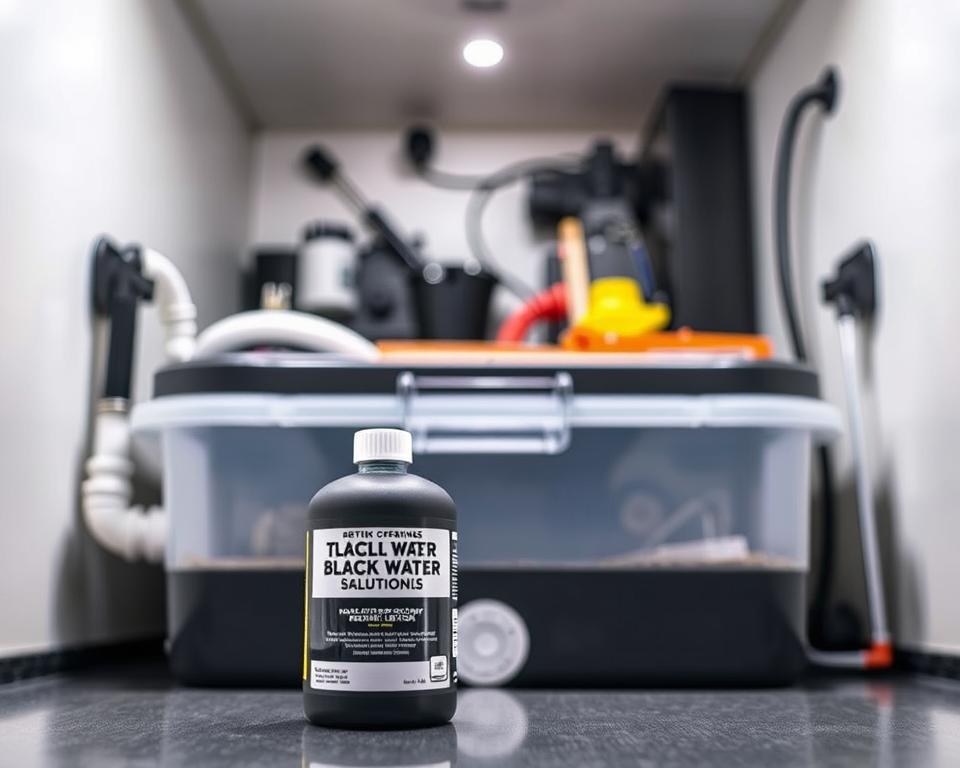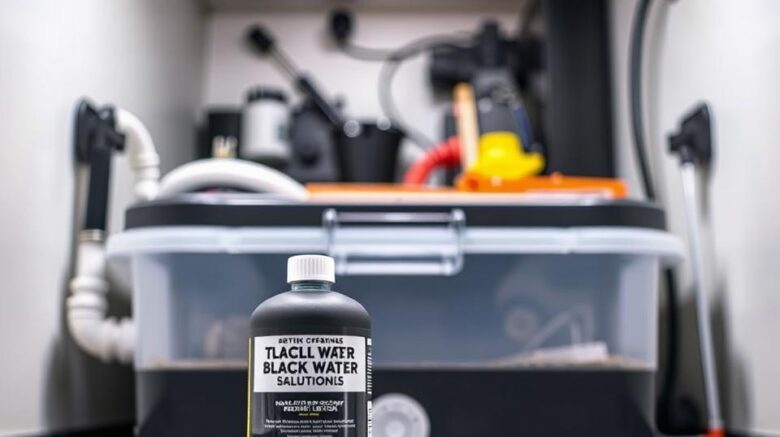RV Black Water Pump: Must-Know Upkeep Tips
Are you sure your motorhome’s black water pump is up to the task, or could it result in campsite headaches? Maintaining your motorhome’s waste system in prime condition is critical. It helps sidestep nasty scents, blockages, and pricey harm. We’ll share indispensable advice to secure your sewage pump operates flawlessly, keeping your travels trouble-free.
Getting to Know Your RV’s Plumbing System
The RV plumbing system is essential for any pleasant excursion. It splits into two main parts: the black water system and the gray water system – RV water pump pressure tank. The black water system gathers waste from the toilet, and the gray water system handles wastewater from sinks and showers.
The systems utilize drain lines that feed into different tanks, designed for streamlined waste management. Each tank has a vent to block gas from building up, keeping the operation is safe and pleasant. Proper waste management in an RV is key to sidestep leaks or bad odors. By knowing both black and gray water tanks, RV owners can maintain and manage waste better.
Knowing how your RV’s plumbing works lets you detect issues promptly. Regular maintenance creates carefree adventures for everyone. Being proactive with your RV’s plumbing system guarantees reliability during your travels.
Kinds of RV Water Tanks
Exploring RVs involves knowing the different tanks. Each one is key to your RV’s performance, needing regular upkeep.
The fresh water tank stores potable water. It’s critical for a comfortable RV experience.
The gray water tank collects sink, shower, and other non-Septic wastewater. Managing this tank keeps your RV clean while traveling. The black water tank, on the other hand, contains toilet waste. It needs routine emptying and attentive maintenance to avoid issues.
By being familiar with the fresh, gray, and black water tanks, RV owners can better handle their systems. This preparedness and ongoing maintenance ensure smooth functionality of the waste management system.
Operation of Black Water Tanks
The working of the black water tank is vital in RV waste management. It receives waste from the toilet via a gravity-fed system. Upon flushing, waste and water are sent into the tank, to be stored until removal is necessary. It’s imperative to keep water levels optimized in the toilet to prevent solid waste buildup.
Understanding how RV waste tanks function can sidestep clogs and odors. Without proper care, solid waste hardens, creating blockages and emptying difficulties. Comprehensive tank flushing techniques are essential to preventing these issues, ensuring smooth functionality.
Consistent inspection of tank mechanics is advised for RV owners. This includes checking flushing methods and ensuring adequate water flow. Knowing these essentials supports efficient tank maintenance, averting expensive fixes later.

Crucial Maintenance Tips for Your RV Black Water Pump
Completing regular maintenance on your RV’s black water pump is essential. First, pick RV-safe toilet paper to minimize clogs and enhance flow. A comprehensive flush can get rid of waste and cut bad smells. Regularly cleaning the tank helps halt residue buildup, keeping your RV clean and comfortable.
Carry out routine inspections to check your pump’s condition. Watch for any signs of wear or damage that could hinder its function. Using specialized tank treatments, like those from All in Sanitation, can significantly enhance both performance and cleanliness. Applying these tips can prolong your pump’s life and upgrade your RV’s living conditions.
Select Camper-Safe Toilet Paper
Keeping your RV’s black water system includes vital steps. One prime tactic is using RV-safe toilet paper for clog prevention. This specifically designed product softens quickly in water, ideal for RV sanitation systems.
RV-safe toilet paper is essential for tank maintenance. It dissolves fast, stopping blockages from slow-decomposing materials. This betters waste disposal efficiency and keeps the plumbing clear.
Select brands designated as RV-safe when buying toilet paper. These products minimize clog risks and boost your black water tank‘s lifespan by preventing buildup. Consistent use secures a stress-free camping experience, void of plumbing troubles.
Proper Tank Cleansing
Thoroughly flushing your black water tank is key for responsible waste management in your RV. To aid waste movement, verify the toilet bowl is sufficiently watered before flushing. Many RVs are equipped with built-in tank flush systems to make the process more effective. For RVs without this feature, attaching tank rinsers that attach to the sewer outlet offers a reliable alternative.
Consistent tank flushing supports waste removal and avoids solid accumulations and bad smells. Continuing this process guarantees your RV stays pleasant, making your travels more enjoyable. A focus on regular and complete tank flushing will improve hygiene and the overall condition of your RV’s plumbing system.
Prevent Build-Up with Regular Cleaning
Keeping your RV’s black water tank free of buildup is vital for its best function. Consistent cleaning gets rid of lingering waste inside the tank walls. This means scouring well with water and using specific RV tank cleaners for tough deposits.
By cleaning often, you halt odors and cut down clog risks. A spotless tank makes RVing better and helps your plumbing last longer. Add tank maintenance into your routine to guarantee smooth travels.
Picking Suitable Additives
Choosing proper chemicals for RV black water pump maintenance is essential for managing waste and reducing smells. Many RV enthusiasts use enzyme-based RV holding tank treatments. These products contain good bacteria to break down solids and reduce bad odors.
Steering clear of harsh chemicals is important to prevent damage to your plumbing. Such substances can corrode pipes, leading to expensive repairs and diminishing your RV enjoyment. Utilizing safe chemicals for odor control ensures your tank and pump’s longevity.
Preserving your RV black water tank in peak form boosts your travel experience. Using the right holding tank treatment routinely secures your system works well.
Timely Tank Emptying
It’s essential to empty your RV’s black water tank at the appropriate point for smooth emptying. Plan to dump when the tank is about two-thirds full is wise. This sidesteps solid waste buildup, providing a quicker emptying process.
Draining at designated stations is imperative for safe, eco-friendly waste handling. It’s important to watch the tank‘s levels closely. Letting it max out can create clogs and make disposal more difficult.
Good timing with correct methods are key for hygienic waste management and can increase your plumbing’s life. Keeping a regular check and doing proper upkeep delivers a pleasant RV living experience.
Maintaining Toilet & Tank Seals
Examining seals around the toilet and tank is critical for leak prevention. Over time, these seals might break down, leading to odors and potential harm. A detailed inspection will identify any wear or damage. Detecting issues early allows for quick replacement to secure a secure connection and odor-free RV.
Keeping a bit of water in the toilet bowl assists in preserving seal condition. This prevention step is essential in RV seal upkeep. It extends the seals’ life, halting leaks and foul odors.
Routine seal maintenance can prevent costly fixes later. By focusing on seal health, RV owners secure a pleasant journey.
Additional Tips for Long-Term Maintenance
Setting up professional servicing for your RV at least once a year is smart, particularly for black water tank care. This strategy aids in identifying problems early and maintains your plumbing system’s integrity.
When getting your RV for storage, fully clean and empty the black water tank first. Use antifreeze to prevent damage from remaining water during cold seasons. Employing this tactic is important for preserving the system, making sure it’s ready for your next adventure.
Regular inspections and preventive actions are key to lengthening your sanitation system’s life. Monitoring connections, hoses, and seals ensures smooth operations. This approach enhances your RV experience, making it enjoyable all year round.
Securing your RV’s black water pump is well-maintained is crucial for a stress-free camping journey. By sticking to the maintenance tips shared, you can retain your black water system running smoothly. It’s key to focus on routine washing, utilizing correct flushing methods, and selecting appropriate chemicals for waste management.
By meeting these maintenance requirements, you will sidestep unpleasant odors and blockages. This also prolongs your RV plumbing system’s durability. Proactive care of the RV black water pump means more time enjoying the outdoors, without concern for potential setbacks.
Remember, proper upkeep is key next time you gear up for an outing. It’s not the highlight of RV ownership, yet it significantly improves your travel experience.
